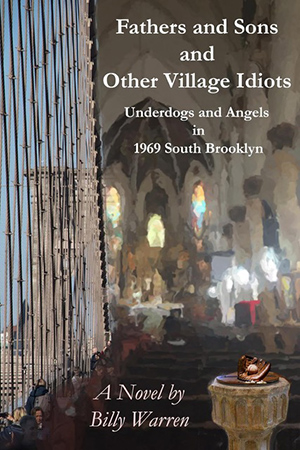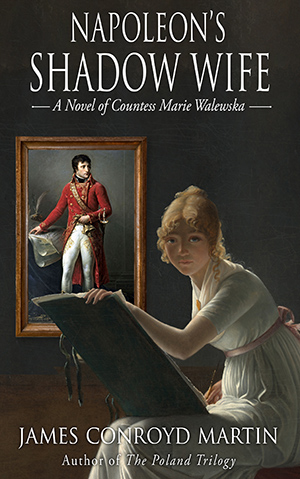BOOKS IN BRIEF
Fathers and Sons and Other Village Idiots
Underdogs and Angels in 1969 South Brooklyn
by Billy Warren
Self-published
238 pages
reviewed by David Trawinski
This debut novel by Polish American author Billy Warren is refreshingly different and original, while at the same time paying homage to the classic Turgenev novel of 1862. Its story arc brings many of those classic themes up to date—well, that is, if that date includes the year 1969. This is a superb work of skillful writing that I believe the readers of this journal will greatly enjoy.
The story begins on January 1st of that year. You find yourself reading the journal of Kazimierz Baranski, a 77-year-old immigrant who has long ago settled in the Polish community near 23rd Street in Brooklyn, N.Y. He has taken to writing a journal to find his inner voice. That is important for reasons both physiological and psychological; Kaz lost his ability to speak to throat cancer, and his wife to another form of that insidious disease. He writes notes to communicate to his two sons, their sons, and a palette of friends (all of whom he refers to as “idiots” living amongst his small village). The character development of this work is masterful, and the reader quickly finds himself immersed in a choppy sea of personalities.
Warren tells Kaz’s life story through the inner narrative of the journal, which includes, in most of its entries, a truthful and poignant recollection of the day’s events, often including rich and well-written dialogue between the characters. The journal format is not new, (dating back at least to 1897’s “Dracula” by Bram Stoker), but is highly effective for communicating the trapped, isolated feelings of a lonely, aged mute, including his feelings of guilt for having survived the same disease that in another form took his beloved wife away from him. Kaz reflects on his days in Poland as a youth, and the turbulent relationship with his own father that eventually drove him and his mother to flee to America. When she does not survive the passage, he enters the rough and tumble streets of New York, then as he is now, alone, isolated, and mute (for then he spoke no English). He is guided to Brooklyn by two markers that remain constantly looming over him for the rest of his life, the Statue of Liberty and the spires of Our Lady of Czestochowa Church near 23rd Street.
Kaz’s life is an incredible one, especially in this eventful and often painful year of 1969. He experiences many of the main events of that year, in an almost “Forrest Gump” like storyline. The Baltimore Colts’ Super Bowl upset by the Jets plays a critical role in the story, as does the moon landing, the massive protests against the Vietnam War, the Woodstock Festival, NYC’s Greenwich Village Stonewall Inn riots, and the World Series upset of the Baltimore Orioles by those Amazing Mets. Yet, these are craftily woven into the journal of Kaz by the author’s use of the experiences of secondary characters in many cases, including his grandsons. Kaz reflects as the varied choices of his grandsons, ever so true to life, cause tension between themselves and their own fathers.
“Fathers and Sons and Other Village Idiots” is an inspiring story of a man who has made a robust life for his family in a new world, but along the way, may have lost sight of how every family has its own squabbles and generational differences. What I found most refreshing about this work is the subtle undercurrent of faith that belies it, and in the end, resurfaces when it is most intensely needed.
I am projecting when I write that the important roles of faith, hope and love (and perhaps some loss of recognition of their power in life at times) may be because Warren is himself a male breast cancer survivor, and perhaps some elements of Kaz’s inner struggles reflect the difficulties of the author’s life journey. He is a second-generation Polish American whose ancestors immigrated to America around 1910. Born and raised in South Brooklyn, he gained his bachelor’s degree from City College of New York in 1975 and his master’s degree from San Jose State in 1981. He writes his literary fiction today from Northern California. Like his character Kaz, and consistent with his inspiration (the work of Turgenev), the author has two sons. I enjoyed this read immensely, as I am sure you will also. I look forward to reviewing his next work as well. This is as strong a recommendation as any reviewer who grew up in East Baltimore can have, given his heartbreak with the losses by the angels of his youth, those Colts and Orioles from Baltimore to the underdog N.Y. Jets and Mets. Still, this is a novel of angels and underdogs, just as the subtitle says, is it not?
Underdogs and Angels in 1969 South Brooklyn
by Billy Warren
Self-published
238 pages
reviewed by David Trawinski
This debut novel by Polish American author Billy Warren is refreshingly different and original, while at the same time paying homage to the classic Turgenev novel of 1862. Its story arc brings many of those classic themes up to date—well, that is, if that date includes the year 1969. This is a superb work of skillful writing that I believe the readers of this journal will greatly enjoy.
The story begins on January 1st of that year. You find yourself reading the journal of Kazimierz Baranski, a 77-year-old immigrant who has long ago settled in the Polish community near 23rd Street in Brooklyn, N.Y. He has taken to writing a journal to find his inner voice. That is important for reasons both physiological and psychological; Kaz lost his ability to speak to throat cancer, and his wife to another form of that insidious disease. He writes notes to communicate to his two sons, their sons, and a palette of friends (all of whom he refers to as “idiots” living amongst his small village). The character development of this work is masterful, and the reader quickly finds himself immersed in a choppy sea of personalities.
Warren tells Kaz’s life story through the inner narrative of the journal, which includes, in most of its entries, a truthful and poignant recollection of the day’s events, often including rich and well-written dialogue between the characters. The journal format is not new, (dating back at least to 1897’s “Dracula” by Bram Stoker), but is highly effective for communicating the trapped, isolated feelings of a lonely, aged mute, including his feelings of guilt for having survived the same disease that in another form took his beloved wife away from him. Kaz reflects on his days in Poland as a youth, and the turbulent relationship with his own father that eventually drove him and his mother to flee to America. When she does not survive the passage, he enters the rough and tumble streets of New York, then as he is now, alone, isolated, and mute (for then he spoke no English). He is guided to Brooklyn by two markers that remain constantly looming over him for the rest of his life, the Statue of Liberty and the spires of Our Lady of Czestochowa Church near 23rd Street.
Kaz’s life is an incredible one, especially in this eventful and often painful year of 1969. He experiences many of the main events of that year, in an almost “Forrest Gump” like storyline. The Baltimore Colts’ Super Bowl upset by the Jets plays a critical role in the story, as does the moon landing, the massive protests against the Vietnam War, the Woodstock Festival, NYC’s Greenwich Village Stonewall Inn riots, and the World Series upset of the Baltimore Orioles by those Amazing Mets. Yet, these are craftily woven into the journal of Kaz by the author’s use of the experiences of secondary characters in many cases, including his grandsons. Kaz reflects as the varied choices of his grandsons, ever so true to life, cause tension between themselves and their own fathers.
“Fathers and Sons and Other Village Idiots” is an inspiring story of a man who has made a robust life for his family in a new world, but along the way, may have lost sight of how every family has its own squabbles and generational differences. What I found most refreshing about this work is the subtle undercurrent of faith that belies it, and in the end, resurfaces when it is most intensely needed.
I am projecting when I write that the important roles of faith, hope and love (and perhaps some loss of recognition of their power in life at times) may be because Warren is himself a male breast cancer survivor, and perhaps some elements of Kaz’s inner struggles reflect the difficulties of the author’s life journey. He is a second-generation Polish American whose ancestors immigrated to America around 1910. Born and raised in South Brooklyn, he gained his bachelor’s degree from City College of New York in 1975 and his master’s degree from San Jose State in 1981. He writes his literary fiction today from Northern California. Like his character Kaz, and consistent with his inspiration (the work of Turgenev), the author has two sons. I enjoyed this read immensely, as I am sure you will also. I look forward to reviewing his next work as well. This is as strong a recommendation as any reviewer who grew up in East Baltimore can have, given his heartbreak with the losses by the angels of his youth, those Colts and Orioles from Baltimore to the underdog N.Y. Jets and Mets. Still, this is a novel of angels and underdogs, just as the subtitle says, is it not?
SEATTLE, Wash. — The author of "The Poland Trilogy" has turned to a fascinating person in Polish history for his latest release, Napoleon’s Shadow Wife.
Born into the lower Polish nobility, the szlachta, in 1786, Marie Walewska was raised in a manor home in Kiernozia, a small town in central Poland. Her early education reflected her aristocratic roots. Before attending a Catholic finishing school for young girls, the family employed as one of her tutors Nicolas Chopin, father of the future composer Frédéric Chopin. But privilege could not shield her from the turmoil engulfing her country. Her father died fighting for Polish independence in the ill-fated uprising of 1794, leaving the family in financial and emotional ruin. With two older brothers emigrating to join Napoleon’s legendary Polish legions and their ancestral estate threatened, Marie’s mother and brothers pressure her to marry a wealthy nobleman many years her senior.
Not quite eighteen, Marie became the wife of Count Anastase Walewski, who had been Chamberlain to King Stanislaw, the last King of Poland. She settled into a dutiful, if loveless, relationship, giving birth to a son within a year. Marie’s patriotism dated to her father’s death while fighting for independence from Russia. Like many Poles, she placed her hopes for Poland in Napoleon, and as he moved toward Poland, she plotted ways to meet him, managing to do so in an unusual way.
While her interest in Napoleon was strictly political—not romantic—the emperor was struck by her beauty and sincerity and began a campaign to win her over. She resisted his advances, but pressure mounted—not only from Polish patriots who saw in her a unique opportunity to influence Napoleon on the matter of independence, but also from individuals very close to Marie.
Initially, Marie’s eventual decision to become Napoleon’s mistress came about as a result of pressure, but, in time, love blossomed for both Marie and Napoleon. Their relationship, though discreet, spanned years and multiple military campaigns. Before meeting Marie, Napoleon feared that he was infertile, but in 1810, Marie gave birth to a son, Aleksander, putting his doubts to rest.
Though Napoleon sought out a marriage with an Austrian archduchess for political reasons, he recognized his son with Marie and provided generously for the futures of both mother and son. And yet, their story was not over.
Throughout it all, Marie remained dignified, her actions shaped by a deep loyalty to both her homeland and the man whose empire could have restored it.
More than a footnote in Napoleon’s life, Marie Walewska stands as a figure of grace, strategy, and quiet courage—a woman who walked the line between matters of the heart and national destiny.
Born into the lower Polish nobility, the szlachta, in 1786, Marie Walewska was raised in a manor home in Kiernozia, a small town in central Poland. Her early education reflected her aristocratic roots. Before attending a Catholic finishing school for young girls, the family employed as one of her tutors Nicolas Chopin, father of the future composer Frédéric Chopin. But privilege could not shield her from the turmoil engulfing her country. Her father died fighting for Polish independence in the ill-fated uprising of 1794, leaving the family in financial and emotional ruin. With two older brothers emigrating to join Napoleon’s legendary Polish legions and their ancestral estate threatened, Marie’s mother and brothers pressure her to marry a wealthy nobleman many years her senior.
Not quite eighteen, Marie became the wife of Count Anastase Walewski, who had been Chamberlain to King Stanislaw, the last King of Poland. She settled into a dutiful, if loveless, relationship, giving birth to a son within a year. Marie’s patriotism dated to her father’s death while fighting for independence from Russia. Like many Poles, she placed her hopes for Poland in Napoleon, and as he moved toward Poland, she plotted ways to meet him, managing to do so in an unusual way.
While her interest in Napoleon was strictly political—not romantic—the emperor was struck by her beauty and sincerity and began a campaign to win her over. She resisted his advances, but pressure mounted—not only from Polish patriots who saw in her a unique opportunity to influence Napoleon on the matter of independence, but also from individuals very close to Marie.
Initially, Marie’s eventual decision to become Napoleon’s mistress came about as a result of pressure, but, in time, love blossomed for both Marie and Napoleon. Their relationship, though discreet, spanned years and multiple military campaigns. Before meeting Marie, Napoleon feared that he was infertile, but in 1810, Marie gave birth to a son, Aleksander, putting his doubts to rest.
Though Napoleon sought out a marriage with an Austrian archduchess for political reasons, he recognized his son with Marie and provided generously for the futures of both mother and son. And yet, their story was not over.
Throughout it all, Marie remained dignified, her actions shaped by a deep loyalty to both her homeland and the man whose empire could have restored it.
More than a footnote in Napoleon’s life, Marie Walewska stands as a figure of grace, strategy, and quiet courage—a woman who walked the line between matters of the heart and national destiny.
NEW BOOKS



